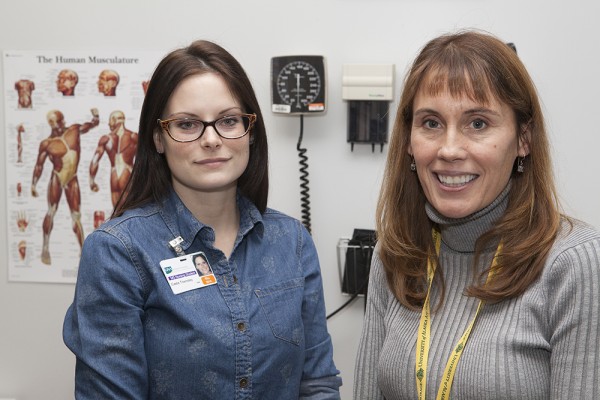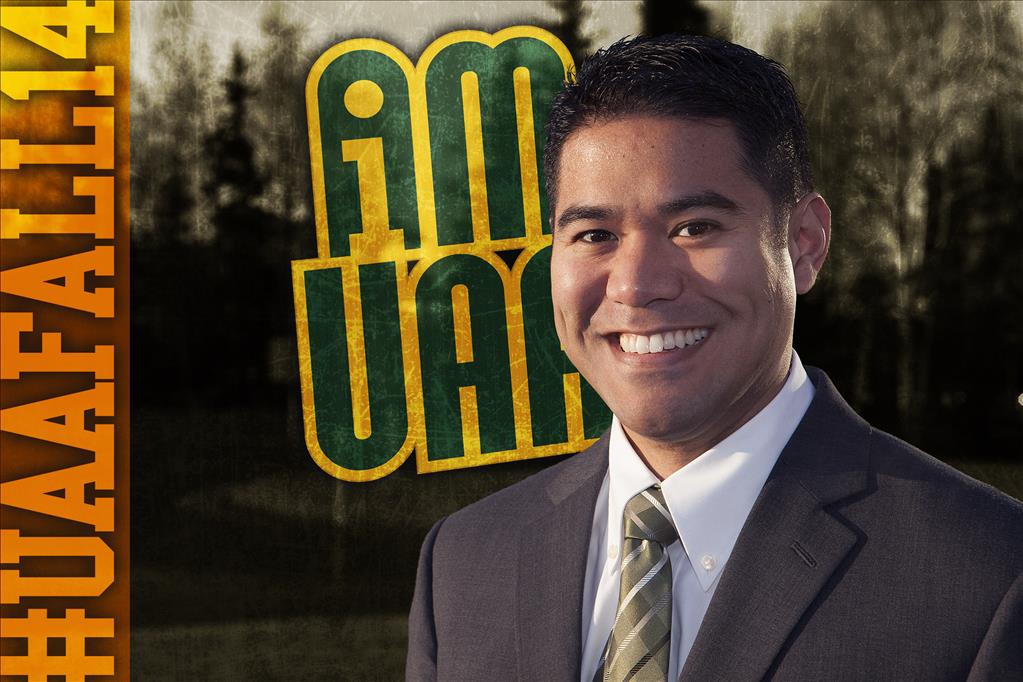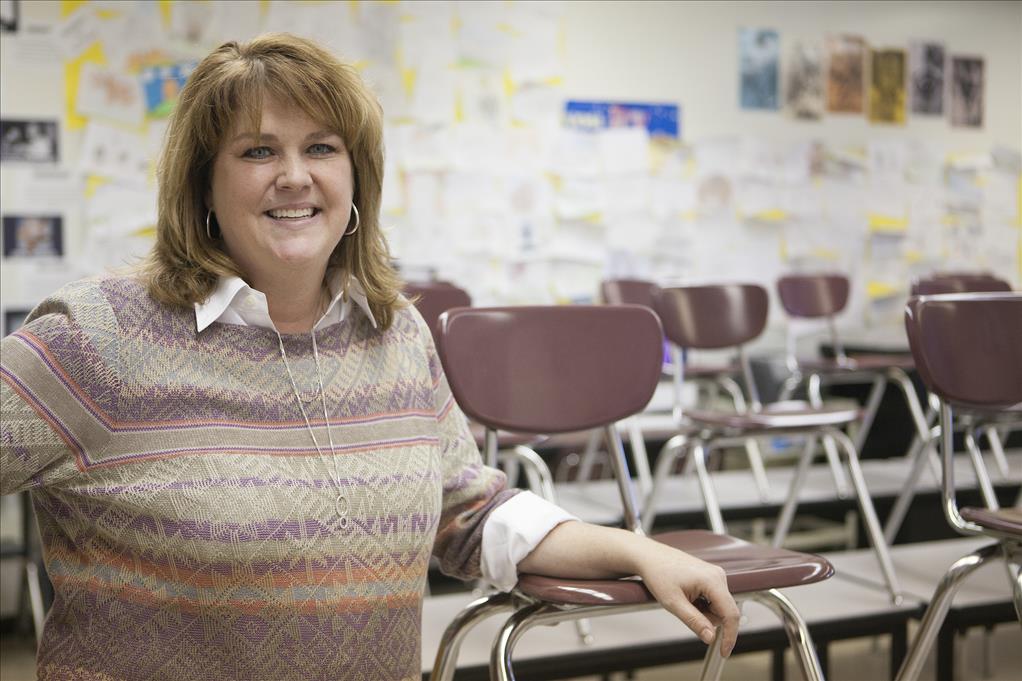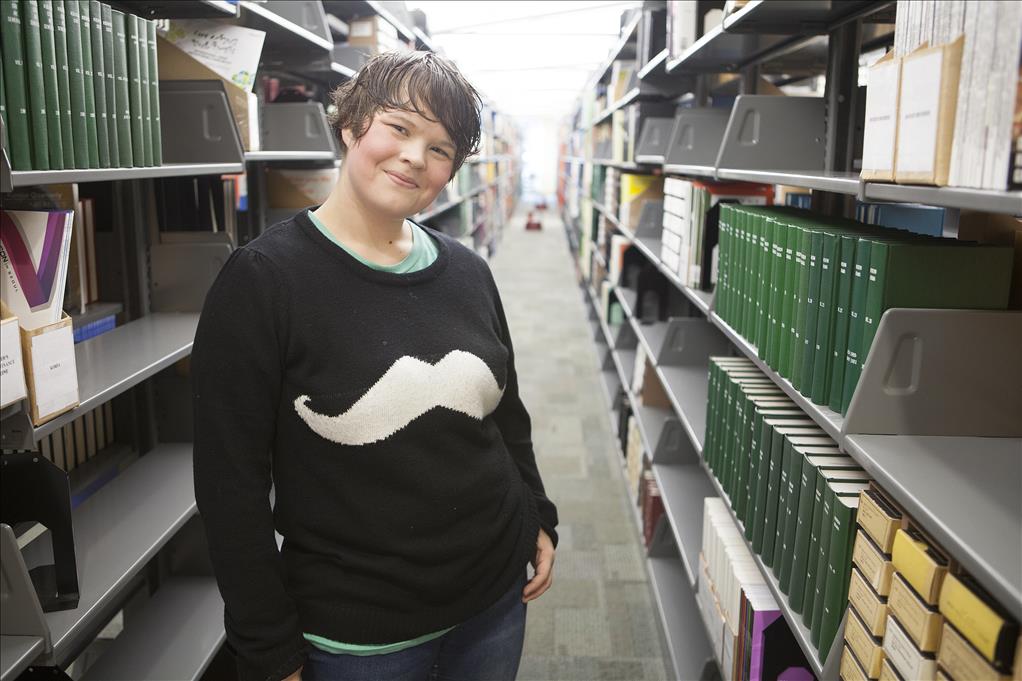SHCC: Guiding UAA's students toward health and knowledge
by Tracy Kalytiak |
Seventeen years ago, Theresa Schmitz was a graduate student in UAA's School of Nursing when she received an opportunity to hone her family nurse practitioner skills at UAA's Student Health and Counseling Center.

Casta Townsley, left, a registered nurse seeking to become a family nurse practitioner, is completing a women's health clinical rotation with the help of her preceptor, Theresa Schmitz, at UAA's Student Health and Counseling Center. (Photo by Philip Hall/University of Alaska Anchorage)
"[SHCC founder] Daryl Young precepted me," Schmitz said. "It was through that experience I knew I wanted to work here."
Now, Schmitz is a SHCC preceptor herself, one of five at the Center. UAA's School of Nursing recently recognized her-as well as SHCC's director, Georgia DeKeyser, and family nurse practitioners Maggie Fitzgerald and Mary Woodring-with its Preceptorship of the Year award for the women's work in 2013-2014 as preceptors for UAA's aspiring FNPs and psychiatric mental health nurse practitioners.
"Because of our connection with the School of Nursing, SHCC's just always been a preceptor site," Schmitz said. "We see that program as a collaborative partnership as students move from the classroom to a practice site."
Providing many facets of care
Preceptors are skilled medical practitioners who supervise students in a clinical setting. They provide oversight, guidance and hands-on help for students who have not yet mastered certain skills and give progressively increasing independence to students who demonstrate expertise in, for example, taking a medical history, determining a diagnosis or performing pelvic exams and other procedures.
UAA nursing students can enrich their education by working at SHCC, which provides high-quality, affordable primary outpatient health care to UAA students carrying six or more credit hours.
Its on-campus clinic-located in Suites 116 and 120 of Rasmuson Hall-employs a physician, advanced and family nurse practitioners, licensed professional counselors, licensed practical nurses, psychiatric nurse practitioners and medical assistants.
Every student taking six or more credits helps sustain the SHCC by paying a fee of $8 a credit.
The SHCC's team provided care to more than 10,538 students during the 2012-2013 academic year, and its health education outreach served more than 24,654 students and community members, according to SHCC statistics.
Students with questions involving physical or emotional health can find answers via SHCC's "Ask Betty" question-and-answer web resource. They can access suicide prevention training, get HIV tests and TB screenings and receive counseling either individually or in a group setting.
The Center collaborates with other organizations to provide food to hungry students and operates an on-site pharmacy that allows students to obtain prescriptions at wholesale cost.
SHCC also:
• Can provide same-day appointments, as well as a generous selection of appointment times.
• Provides a student direct and immediate access to a licensed behavioral health specialist if he or she calls SHCC and needs help.
• Helps connect students with police, faculty, the CARE Team, academic and Dean of Students counselors, Disability Support Services, Multicultural Center, Student Life and Leadership, student government, Residence Life and administrative leaders.
• Shares vendor relationships with UAA Athletics, making it possible for trainers to obtain things like athletic tape, bandages and other medical supplies at wholesale cost.
Students pay less for services at SHCC than they would if they received those same services at other providers in Anchorage.
A student needing a strep screen, for example, could pay $70 for that test at one Anchorage clinic. At SHCC, the cost for that same strep screen is $8.
How does SHCC contain costs? Cross training staff, to increase flexibility in their functions, is one technique SHCC uses to shave expenses and hone efficiency. Another is using advanced nurse practitioners to dispense medication, sidestepping the need for an on-site pharmacist.
'They're on a huge learning curve'
Schmitz says she, Fitzgerald and Woodring currently are precepting students preparing to be FNPs, while DeKeyser is training a psychiatric nurse practitioner and Betty Bang, an SHCC advanced nurse practitioner and health educator, works with a student who is preparing to be a baccalaureate-level registered nurse.
"The people I precept, they're nurses already," Schmitz said. "They've drawn blood, they've given shots. What they're learning about is coming up with a differential diagnosis and then figuring out what tests need to be ordered to support that, coming up with a treatment plan. It's more critical thinking."
The FNP students at the Center focus on women's health.
"They learn to use a speculum, use a microscope to view cells from the vagina and look for infections," Schmitz said. "What I've heard is that sometimes it's really hard to get gynecology placements. Women's health is a pretty sensitive area-a lot of people may not want a student seeing them [during an appointment]-but here, it's not a big issue because most students are open to the experience and want to help a fellow student learn as much as they can."
Schmitz says she and other preceptors try to take extra time in appointments when students are with them.
"They're on a huge learning curve," she said. "It takes extra time to learn things. We schedule as much as we can when they're here."
Students tend to be working on their women's health clinical rotation, but Schmitz says they'll see other cases as well since SHCC provides the general services of a family practice.
"In their second year, they'll see variety," she said. "They could be doing anything from contraception consultation-talking to someone about the best birth control for them-to a biopsy to an upper respiratory infection to abdominal pain to a sprained ankle to a migraine. It's wide open. It's whatever would be in a primary care clinic."
'I just like connecting with people'
Schmitz started precepting in 2000. Sometimes the experience challenges her.
"I worked with a student who was young and her confidence was lacking," she said. "I think I helped instill in her that she has what it takes, that it's just going to take time and the confidence would come. We worked pretty hard at that. I think I helped in her seeing her abilities."
How do students finally reach the point of independence, assurance and mastery?
"It just comes with time and experience," Schmitz said. "If somewhere in the back of their brain they remember this one experience, you build on that. It just happens. They figure out what's important and what's not, learning how to get from A to B without going all the way around. It's about helping them think differently than they've ever thought before."
First-year students work for 60 hours while second-year students put in 120 to 150 hours at SHCC, Schmitz said.
"They watch me for a day," she said. "I follow them, watch them take a history, give a physical exam. If they're doing something completely new, I'm in the room with them. I'm all about them being as independent as they can be. If the person has counseled five people on emergency contraception, she probably has gained good sense and comes to me with decisions. If it's something she's never seen before, pelvic pain, I let her get a history and I come in for the pelvic exam."
Casta Townsley, 29, the student Schmitz is precepting, is a registered nurse who earned her bachelor's degree at UAA. As an undergraduate, Townsley used to visit the SHCC to get vaccinated and have blood drawn. Now, she provides care-working through a six-week women's health clinical rotation as she moves toward becoming a family nurse practitioner.
"Theresa's a valuable resource, I feel like I have a lot to learn from her," she said. "My background is in surgical nursing, so naturally moving into women's health is a challenge for me. Theresa's helped me with the annual exams, the steps you have to take to gather samples, the different testing that needs to take place at certain periods of time. She's very patient, up to date on the current guidelines, any questions i have she can answer or direct me to a resource that would answer that question."
Schmitz, the daughter of a nurse, became a nurse herself because "it just seemed like a good fit." She went on to become a family nurse practitioner because she wanted more autonomy.
"I just like connecting with people, sitting with them, talking with them, being able to help them with whatever they come in with," she said. "I just love teaching. Helping someone gain knowledge and be better at something and to know I helped them get to that point is satisfying to me."
Written by Tracy Kalytiak, UAA Office of University Advancement
 "SHCC: Guiding UAA's students toward health and knowledge" is licensed under a Creative Commons Attribution-NonCommercial 4.0 International License.
"SHCC: Guiding UAA's students toward health and knowledge" is licensed under a Creative Commons Attribution-NonCommercial 4.0 International License.














